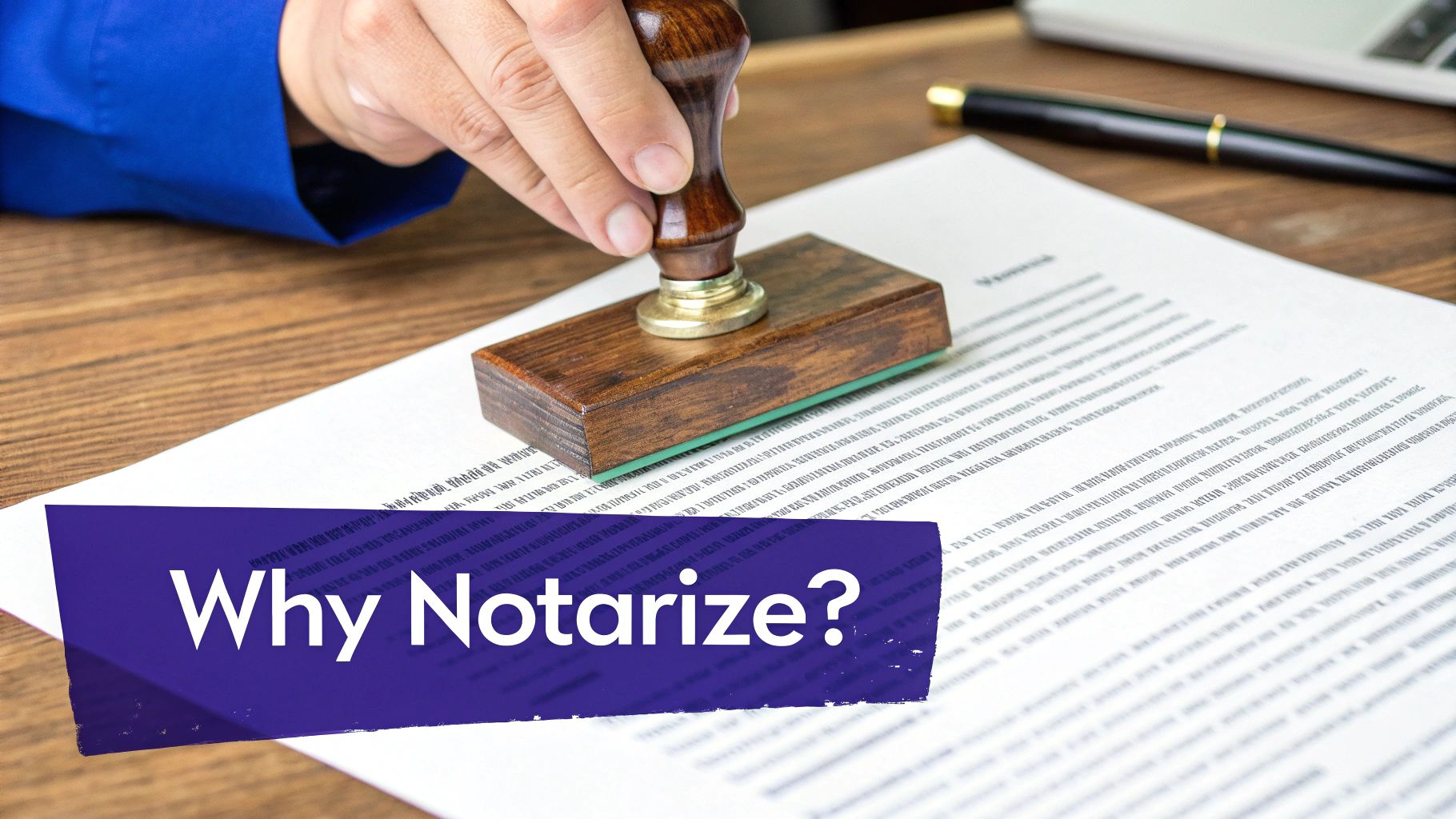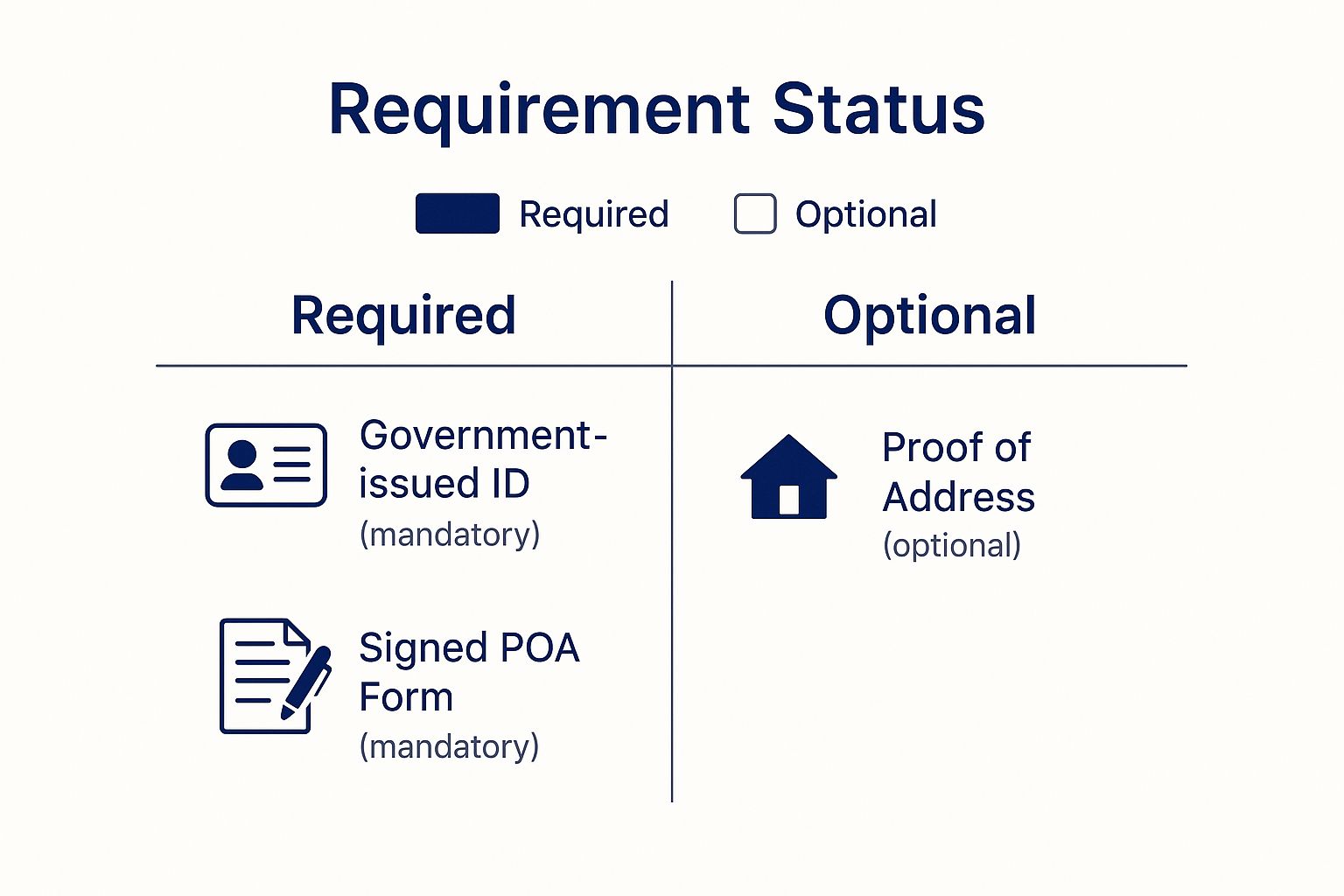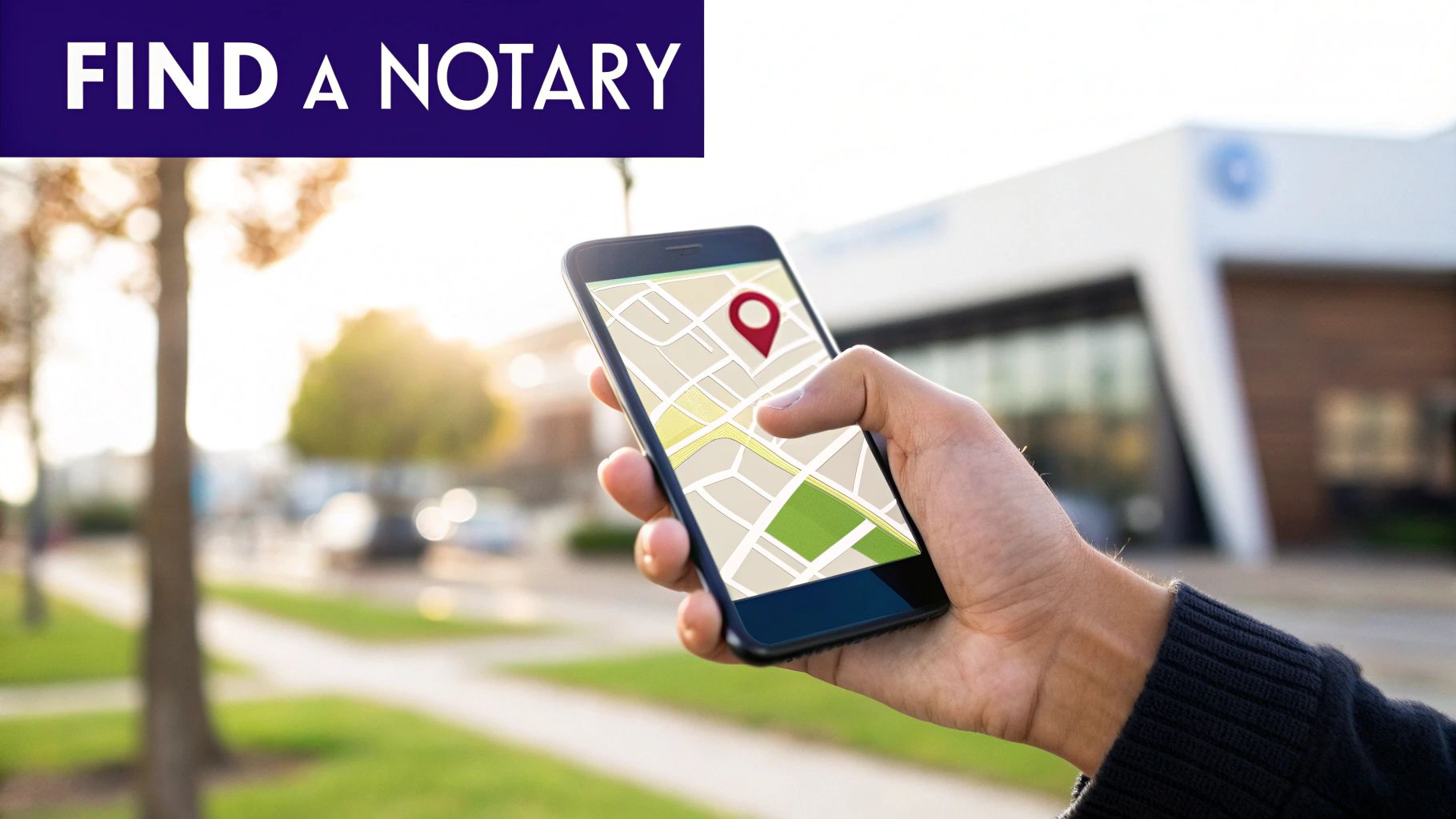How to Notarize a Power of Attorney
- WebsiteFix Technical Partner
- Aug 4, 2025
- 13 min read
Updated: Aug 5, 2025
Getting a Power of Attorney (POA) notarized isn't just a suggestion—it's the crucial step that breathes legal life into the document. Think of it as the final, official seal of approval that makes your POA legally binding. The process brings together you (the principal), your chosen representative (the agent), and a notary public, whose job is to verify everyone's identity and witness the signing. This validation is absolutely essential for ensuring banks, hospitals, and other institutions will accept the document without a second thought, whether you complete the process in person or using a convenient remote online service.
Why Notarizing a Power of Attorney Is a Non-Negotiable Step

A Power of Attorney is a mighty legal tool, but without a notary's stamp and signature, it's really just a piece of paper with good intentions. The notarization itself is a powerful deterrent to fraud. A notary public is an impartial, state-licensed professional acting as a witness. Their main function is to confirm your identity and make sure you're signing the document willingly, with a clear understanding of what you're doing.
This formal verification gives third parties—like your bank or a medical facility—the confidence they need to trust that your POA is authentic. This guide breaks down exactly what's involved in notarizing a power of attorney, a core service within the Notary Public industry.
The Key Players and Their Roles
Knowing who needs to be involved is the first step to making this process go smoothly. Each person has a very specific and important role to play.
The Principal: That's you—the person granting authority to someone else. You absolutely must be of sound mind when you sign the document.
The Agent (or Attorney-in-Fact): This is the person you’ve chosen to act for you. In many cases, they don't actually need to be present for the notarization, unless the document requires them to sign an acceptance of their duties right then and there.
The Notary Public: This is the state-commissioned official who will verify your identity, witness you signing, and then complete the process by adding their own signature and official seal to the document. This can happen in person, via a mobile notary, or through a secure online platform.
Key Takeaway: The whole point of notarizing a POA is to prevent fraud and coercion. The notary’s job is to confirm you are who you say you are and that you aren't being forced to sign. This simple act is what makes the document legally solid.
This isn't some new bureaucratic hoop to jump through. The practice of notarizing important documents has a long history. Some of the principles we follow today can be traced all the way back to the French Marine Ordinance of 1681, which was designed to ensure documents were considered valid across different jurisdictions. This historical context explains why the process still involves such strict identity checks and formal procedures.
How Notarization Protects You
When you get your POA notarized, you're creating an official record of the signing event. This becomes incredibly important if the document's authenticity is ever questioned down the road. The notary keeps a detailed journal, and that entry—which often includes the date, time, and type of ID you presented—serves as powerful evidence that the signing was legitimate.
For a closer look at why this process is so fundamental to legal documents, you can learn more by unlocking the power of notarization at https://www.signatureondemand.net/post/unlocking-the-power-of-notarization-your-guide-to-why-you-need-a-notary.
Getting Your Power of Attorney Ready for the Notary

Before you even start looking for a notary, your Power of Attorney document needs to be in perfect order. I've seen it happen time and again—a simple mistake or a blank field can stop the entire process cold, forcing a do-over. Getting this preparation right from the start is your ticket to a quick, successful notarization. This is especially true for remote online notarization, where the document must be uploaded and ready to go.
The biggest rule, and the one most people accidentally break, is this: Do not sign the document ahead of time. A notary's core function is to watch you—the principal—sign the document, whether that’s in person or on a screen. If you show up with a POA that’s already signed, the notary has to turn you away. They can't legally verify a signature they didn't witness.
This is more than just a minor hiccup; it invalidates the entire act and can cause major delays, which is the last thing you need when dealing with urgent matters. Always, always wait until you are face-to-face (or screen-to-screen) with the notary before you pick up that pen.
Your Pre-Notarization Checklist
Think of this stage as your final pre-flight check. Meticulously review every part of your POA, ensuring all the information is complete and correct. This diligence is crucial whether you're meeting a mobile notary at a coffee shop or using a remote online platform from your home office.
Here’s a practical rundown of what to look for:
Fill In All the Blanks: Go through and complete every required field on the form. This means names, addresses, and any specific dates. The only things that should be empty are the signature lines for you and the notary. An incomplete document is a non-starter.
Check Names and Roles: Spelling counts. Double-check that the principal's name (that’s you) and the agent's name are spelled correctly and consistently throughout. There should be no confusion about who is granting the power and who is accepting it.
Clarify the Powers: The scope of your agent's authority needs to be crystal clear. Vague descriptions like "handle my affairs" can cause serious legal headaches down the road. Be specific about what your agent can and cannot do.
Expert Tip: Never leave a field blank intending to "fill it in later." Empty spaces on a notarized document are a red flag and can open the door to fraud. If a section doesn't apply to your situation, simply write "N/A" or "Not Applicable." This shows the space was left blank intentionally.
A Power of Attorney is a foundational part of any solid estate plan. As you're getting your documents in order, you might find other helpful resources, like these essential estate planning forms, to be valuable.
State-Specific Rules Matter
Notary laws are not a one-size-fits-all deal. The requirements in Florida are different from those in Texas, which are different from California's. It's on you to make sure your POA form is compliant with your state’s laws.
Pay special attention to witness requirements. Some states demand that one or even two witnesses be present during the signing, in addition to the notary. Critically, these witnesses must be disinterested parties—meaning they can't be your agent or stand to benefit from the POA.
Also, you must confirm that the document includes the proper notarial certificate wording for your state. Using a generic or out-of-state certificate is a common mistake that can render the entire notarization invalid. Using state-specific legal forms or a compliant document preparation service can help you avoid these costly errors.
Choosing Your Notary Service: In-Person vs. Online
Not long ago, getting a power of attorney notarized meant finding your way to a bank or a lawyer's office during their business hours. It worked, but it wasn't always convenient. Thankfully, things have changed. Today, you have more flexible options that cater to your specific needs, from mobile notaries who travel to you, to fully remote online notarization (RON) platforms that let you complete the process from your computer.
The traditional method—visiting a notary public in person—is still a solid choice. But if you're looking for something that fits your life better, you'll want to explore the two modern alternatives that have really taken off: mobile notaries and Remote Online Notarization (RON).
Mobile Notaries and Remote Online Notarization (RON)
Think of a mobile notary as a notary who comes to you. They can meet you at your home, office, a hospital, or even a local coffee shop. It's a fantastic service for anyone who finds it difficult to travel or is simply juggling a packed calendar.
Remote Online Notarization (RON) takes convenience to a whole new level. This is where you connect with a commissioned notary through a secure video call on your computer or smartphone. It means you can get your POA notarized from practically anywhere in the world, completely breaking down geographical barriers. It's an incredibly powerful tool for modern legal and personal affairs, especially for time-sensitive matters.
If you're curious about the specifics of this technology, you can learn more about these secure and convenient remote online notary services.
No matter which path you choose, some requirements are universal. The image below breaks down the essential documents you'll need to have ready.

As you can see, your government-issued ID and the completed POA form are the core documents you must have on hand.
Comparing Notary Service Options
To help you decide, let's break down the key differences between these services. Each has its own set of advantages depending on what you value most—be it convenience, speed, or a traditional face-to-face meeting.
Feature | Traditional In-Person Notary | Mobile Notary | Remote Online Notary (RON) |
|---|---|---|---|
Location | Fixed office location | Your chosen location | Anywhere with internet |
Convenience | Low (requires travel) | High (notary comes to you) | Maximum (fully virtual) |
Speed | Varies; appointment needed | Fast, but requires travel time | Very fast; often under 15 minutes |
Scheduling | Limited to business hours | Flexible scheduling | 24/7 availability common |
Cost | Lowest cost per signature | Higher; includes travel fees | Moderate; flat platform fee |
Security | Physical ID check; wet ink | Physical ID check; wet ink | Multi-factor ID verification |
Ultimately, the best choice hinges on your unique circumstances. If you prefer a personal touch but can't travel, a mobile notary is perfect. If you need it done right now from wherever you are, RON is unbeatable.
Why RON Is Such a Big Deal
The adoption of Remote Online Notarization has been nothing short of explosive. Its usage skyrocketed by an incredible 547% after 2020, as people and businesses quickly recognized its value.
This isn't just a passing trend. With 40 states now authorizing their notaries to perform RON, it's become a mainstream solution for getting documents legally finalized.
Here's a real-world example: Imagine your elderly mother lives in Florida, but you're based in California. She needs to grant you a medical power of attorney, and time is of the essence. Instead of one of you having to book a last-minute flight, you can both hop on a secure RON session from your own homes. Professional document preparation services can even ensure the form is correct before the session begins. The identity checks, signing, and notarization can all be completed in less time than it takes to watch a sitcom.
The advantages are crystal clear. RON offers incredible speed, robust security through advanced identity verification, and unparalleled accessibility. It’s the ideal solution for anyone who is traveling, living abroad, or simply can't make it to an in-person appointment. Your choice comes down to what matters most: physical presence or digital efficiency.
What to Expect During the Notarization Session

Knowing what to expect during a notarization appointment can take a lot of the stress out of the process. It helps everything go that much more smoothly. Whether you've arranged for a mobile notary to meet you at a coffee shop or you're logging into an online platform from your living room, the fundamental steps are pretty much the same.
The whole process is designed to be secure and official—it has to be, to protect everyone involved. Your job is simple: prove you are who you say you are and sign the document without being under any pressure. The notary's job is to verify your identity, witness your signature, and make an official record of the event. It’s that verification that gives your Power of Attorney its legal weight.
The Identity Verification Step
First things first: identity verification. This is the absolute most critical part of the entire session. If the notary can't confirm your identity, the process stops right there. It’s a legal requirement.
For a classic in-person or mobile notary appointment, you’ll need to have a valid, unexpired, government-issued photo ID ready. The most common forms are:
A state-issued driver’s license or ID card
A U.S. passport or passport card
A U.S. military ID card
A quick but essential tip: make sure the name on your ID is an exact match for the name printed on your Power of Attorney. Even a small discrepancy can cause issues. For a full rundown on acceptable IDs, this guide to notary identification requirements is a great resource.
With Remote Online Notarization (RON), the security gets kicked up a notch. You'll still show your ID to the camera, but you'll also go through a more layered verification. This usually includes answering a few "knowledge-based authentication" (KBA) questions—things pulled from your public and credit records that only you should know. It’s a good idea to get familiar with these modern identity verification protocols to ensure your online session is seamless.
Signing and Sealing the Document
Once the notary has confirmed it’s really you, they’ll shift focus to the document itself. They need to be sure you understand what you're signing and that you're doing it willingly. Don't be surprised if they ask you to verbally confirm that you grasp the purpose of the Power of Attorney and are signing it freely. This is a standard part of their duty.
Then, it's time to sign. You'll do this right in front of the notary—or on camera, if it's a remote session.
Important Reminder: Only the principal (the person giving the power) absolutely has to be there to get their signature notarized. The agent usually doesn't need to attend unless the document specifically states their signature is also required at that time.
After you’ve signed, the notary takes over. They will meticulously fill out the notarial certificate portion of your document. This includes their own signature, the date, their commission information, and the grand finale: their official seal or stamp. That seal is what makes the notarization complete and legally binding.
With today’s efficient online platforms, this whole process can be wrapped up in as little as 15 minutes.
What to Do After Your Power of Attorney Is Notarized
Getting that notary seal on your Power of Attorney is a huge step, but don't put the document away just yet. The work you do after the signing is just as important as the notarization itself. Proper handling from this point on ensures your POA will actually work when you or your family needs it most.
The first order of business is getting the document into the right hands. Not everyone needs the original, and being strategic about who gets what is the best way to keep the primary document from getting lost or misused.
Distributing Copies of Your POA
Figuring out who needs a copy of your POA can feel a bit overwhelming, but there's a simple rule of thumb. It really comes down to who needs the original versus who just needs to be in the loop with a high-quality copy.
These are the people and places that almost always require the original notarized POA:
Your primary agent: This is non-negotiable. They must have the original document to present to banks, medical staff, and other institutions. Without it, their hands are tied.
Financial institutions: Banks, investment firms, and retirement plan administrators will demand the original to verify your agent's authority before granting them access to your accounts.
Real estate transactions: If your POA grants the power to buy or sell property, the county recorder's office will need the original document for their official records.
For almost everyone else, a good photocopy or a PDF scan will do the trick. This group includes your backup (successor) agents, other family members, your doctors, and your lawyer. Giving them a copy keeps them informed without risking the all-important original.
A Practical Tip: When you hand out a copy, consider making it a "certified copy." While a few states, like California, have specific rules allowing notaries to certify copies of a POA, in most places, it's much simpler. You or your agent can just write a short statement on the photocopy itself, attesting that it's a true and accurate copy of the original.
Secure Storage and Clear Communication
Think of your original POA as a master key to your financial and personal life—it's a powerful document that needs to be protected from fire, water damage, theft, or simple misplacement. A home fireproof safe is an excellent choice. A safe deposit box also works, but you have to solve the access problem: how does your agent get into the box if you're incapacitated?
Just as crucial as safe storage is open communication. Your agent can't step in to help if they don't know the POA exists or can't find it. Sit down with your primary and successor agents. Walk them through their duties, make sure they are still willing to take on the role, and tell them precisely where the original POA is kept.
Finally, remember that a Power of Attorney isn't a "set it and forget it" document. Life happens. Relationships and circumstances change. It's smart to review your POA every few years to make sure it still aligns with your wishes. If a major life event occurs—like a marriage, divorce, or the death of an agent—that's your cue to revisit your POA immediately. You may need to formally revoke the old one and create a new one to keep your affairs in order.
Common Questions About POA Notarization
Even with the best preparation, a few questions can pop up when you're ready to notarize a Power of Attorney. Let's tackle some of the most common ones I hear from clients, so you can move forward with total confidence.
How Much Does It Cost to Get a POA Notarized?
The price for notarizing a POA isn't one-size-fits-all; it really depends on the path you take. A traditional notary at your local bank or a UPS store might only charge a small, state-mandated fee for each signature.
But when you pay for convenience, the pricing structure changes.
Mobile Notaries: These notaries come directly to you, which is a huge help. Their fee covers the standard signature charge plus a travel fee, so you can expect to pay anywhere from $50 to $150, sometimes more depending on how far they have to drive or if it's an after-hours appointment.
Remote Online Notarization (RON): Online platforms typically offer a single, flat fee for the whole experience. This usually lands between $25 and $75. That price includes the tech for verifying your identity, the live video session with the notary, and the final, electronically sealed document. It’s a straightforward price for a very streamlined process.
Can I Notarize a POA for Someone in Another State?
Yes, you absolutely can. This is one of the biggest advantages of modern notary services and a huge relief for families who are geographically separated.
Remote Online Notarization (RON) was built to overcome distance. As long as the notary is licensed in a state that has approved RON, they can legally notarize documents for a signer located virtually anywhere on the planet. For example, a notary commissioned in Florida can legally notarize a POA for a principal who is physically in California or even on vacation in Italy.
Key Takeaway: What matters legally is the notary's location and their state commission, not where you (the signer) are. This makes RON an incredible tool for families spread across the country or the globe, eliminating the need for costly travel to get crucial documents signed.
What If I Make a Mistake on the Document?
Finding an error on your POA can feel like a disaster, but it's usually a manageable problem. The most important rule is: do not try to correct it yourself by scribbling or using white-out after it's been signed. Any change that isn't properly documented can make the entire document invalid.
How to fix it depends on the mistake. If it's a minor typo, like a misspelled street name, the notary might be able to handle it. They could draw a single line through the error, write the correction nearby, and have the principal initial the change. This is entirely up to the notary's professional judgment and what their state laws allow.
However, for bigger issues—like an incorrect legal name, the wrong person listed as the agent, or a mistake in the powers being granted—you'll almost certainly need to start fresh with a new document. The safest move is always to call your notary or the service that helped you prepare the document. They can tell you if a simple fix is possible or if you need a new POA to ensure it’s legally solid.
When you need a power of attorney notarized quickly and professionally, Signature on Demand offers the flexibility to fit your life. Whether you need a mobile notary to come to your location 24/7 or prefer the speed and security of remote online notarization from anywhere, we make the process simple. For expert document preparation and dependable notary services, visit us at https://signatureondemand.net.

Comments